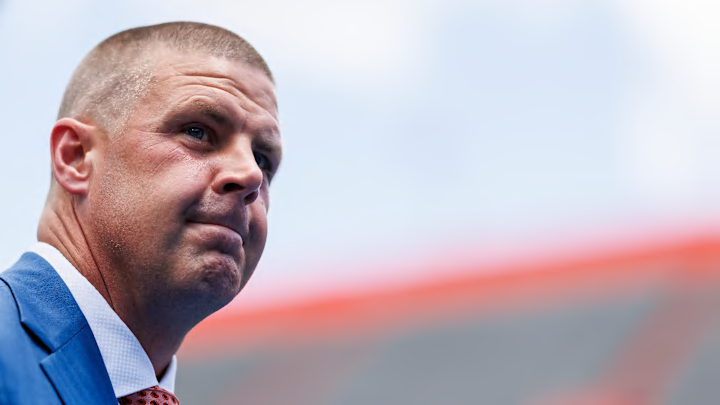Few situations are as perplexing as the current state of the Florida Gators under head coach Billy Napier. What was supposed to be a triumphant resurgence has instead become a tale of misplaced expectations and unforeseen challenges.
At the heart of this struggle lies an unexpected Achilles' heel: the offensive line.
Florida had 8 total yards of offense in the 1st quarter.
— Florida Gators 🐊🔥 (@gatorsszn) September 14, 2024
On the other side of the ball, they gave up a whopping 174 yards… pic.twitter.com/REMsYwxwQG
When Napier arrived in Gainesville, he had a reputation as an offensive line guru. His track record at Louisiana was impressive, producing NFL-caliber talent like Max Mitchell, Kevin Doston, and O'Cyrus Torrence. The expectation was clear: Napier would transform Florida's trenches into a formidable force. Instead, the Gators grapple with a crisis that few saw coming.
The numbers paint a stark picture. Since Torrence's departure to the NFL, Florida has surrendered a staggering 44 sacks in just 15 games. This vulnerability up front has ripple effects across the entire offense, stifling the run game and putting undue pressure on the quarterback. It's a far cry from the dominant lines Napier cultivated at Louisiana, raising questions about the transferability of his methods to the SEC level.
Napier's approach to addressing this issue has been unconventional, to say the least. The Gators now have two full-time offensive line coaches in Rob Sale and Jonathan Decoster. This dual-coach strategy, while innovative, has yet to yield the desired results.
It begs the question: Is this a case of too many cooks in the kitchen, or a necessary measure to combat the elite defensive fronts of the SEC?
The offensive line's struggles are symptomatic of larger issues within the program. Napier's reliance on the transfer portal to plug holes has led to a patchwork unit lacking cohesion. Right guard Dameion George Jr. and right tackle Brandon Crenshaw-Dickson, both transfers, man the right side of the line. While this approach provides immediate experience, it potentially hinders long-term development and culture-building within the program.
This brings us to the crux of Florida's current dilemma: the patience paradox. Athletic Director Scott Stricklin recently stated, "We have been patient at the university. That patience is going to be rewarded. I really believe Billy Napier is going to be the head coach at Florida for a long, long time."
But in the win-now culture of the SEC, how long can this patience last?
The financial implications of Napier's potential buyout – a whopping $26 million – undoubtedly play a role in this patience. It's a figure that would give any administration pause, especially in an era of tightening athletic budgets. Yet, the cost of continued mediocrity in terms of lost revenue and fan disengagement could ultimately outweigh even this hefty sum.
Complicating matters further is the lingering influence of Florida's storied past. The "Ghost of Foley," referring to former AD Jeremy Foley's legacy, still haunts the halls of the athletic department. This connection to the past creates a unique pressure cooker environment where the echoes of championships past clash with the realities of the present.
The "Gator Way," once a source of pride, now seems more like a joke. As one former UF head football coach noted, "Nothing changes around here."
This resistance to change, born from years of success, may be the very thing holding Florida back from adapting to the modern landscape of college football.
Looking ahead, Napier and his staff face a critical time. The upcoming game against Mississippi State represents more than just another SEC matchup; it's a chance to show tangible progress in the trenches. As left tackle Austin Barber stated, "It's just going into practice and nipping the things in the bud we have to fix. I think we'll do a good job of that. I trust the guys in this room."
This trust within the locker room will be crucial as Florida navigates the remainder of its daunting schedule. The Gators must find a way to translate practice improvements into game-day performance, particularly in pass protection and run blocking consistency.
For Napier, the challenge extends beyond X's and O's. He must find a way to blend his Louisiana success with the unique demands of SEC football. This may require a reevaluation of his recruiting strategy, coaching methods, and overall program philosophy.
